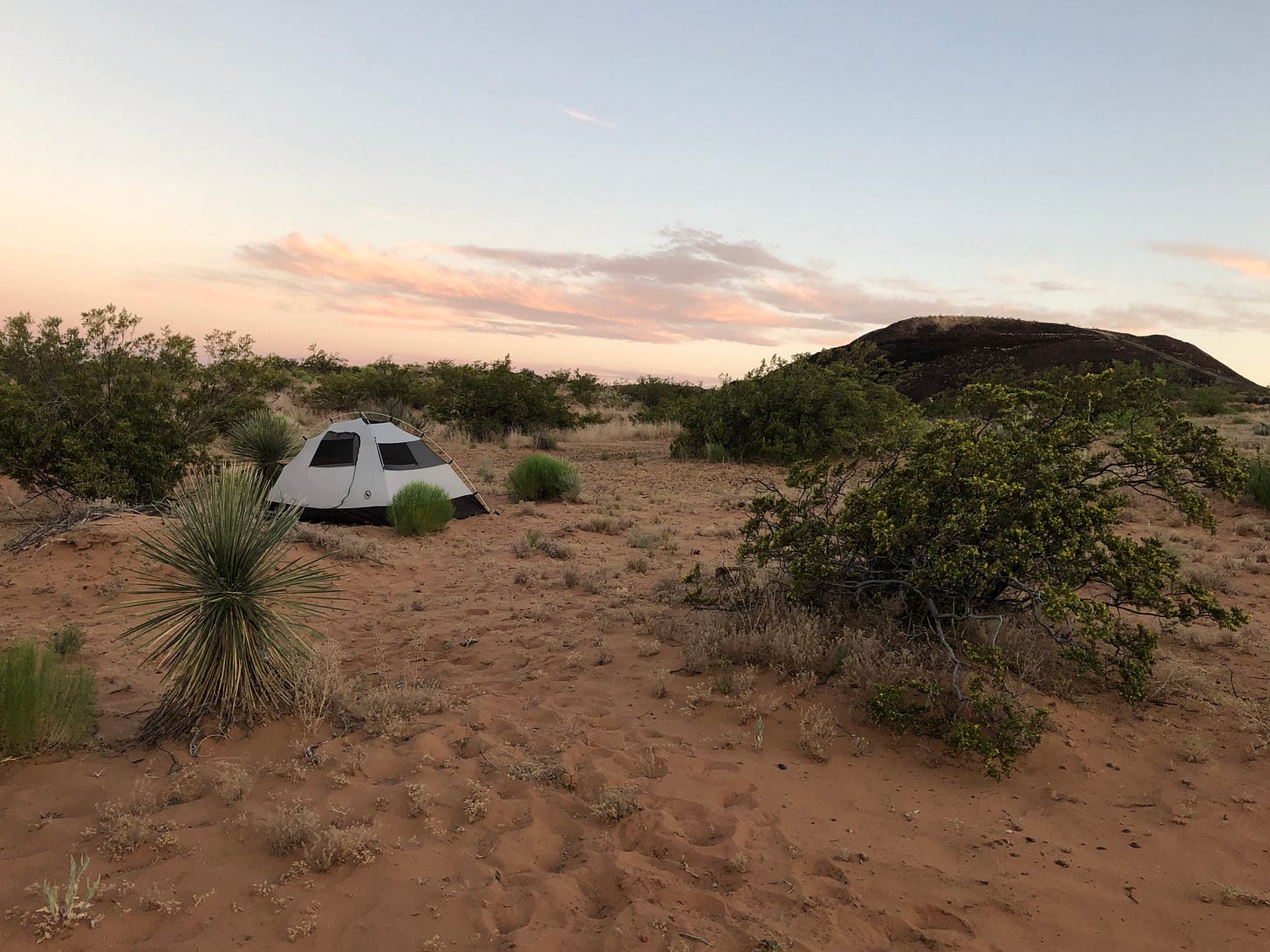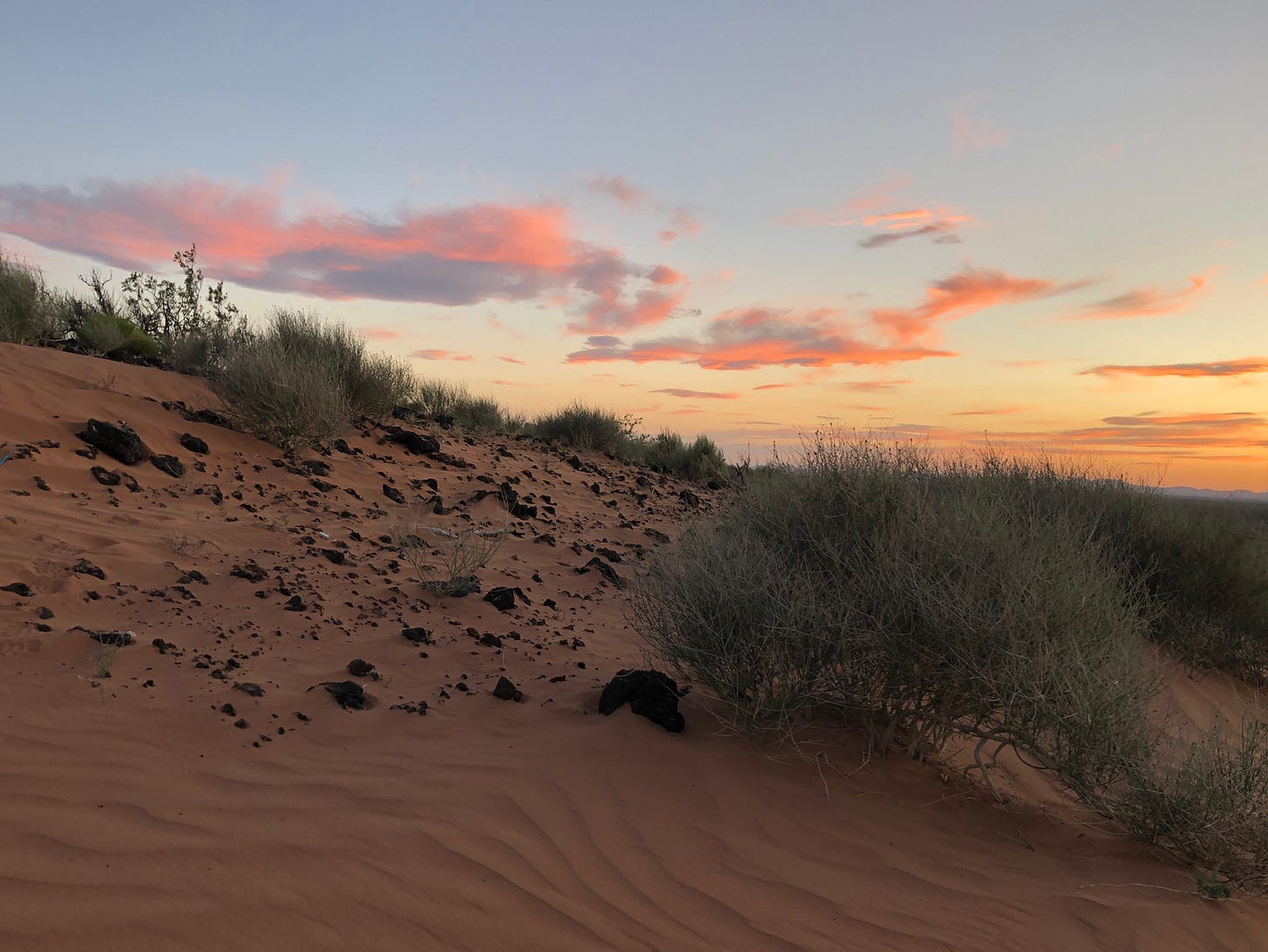Full Moon Ruminations
At the bottom of an isolated sand dune somewhere in La Mesa, New Mexico, I pitch a camping tent. The soft brown dunes stand adjacent to this black volcanic looking mountain that I believe use to be a mine. A squat version of what looks like Sumac is blooming in these sandy soils and it reminds me of the summer I spent in Pembroke, Illinois. If it weren’t for the blazing heat, I might forget that I’m in the desert. The dune top offers me a spectacular view of the mountains in the east. When I look to the west, there’s nothing but an expansive desert. I came to watch the full moon rise tonight.
Just after a sunset, I scurry down the dune to light a small fire and wait. While waiting, I notice my impatience growing. The sky transmutes blazing colors to absolute darkness, but still no moon. I catch myself thinking “What if the moon never rises?” Of course, the enormous gorgeous globe eventually peaks out over the mountains and I feel silly for doubting. In that moment I realize that being indoors the majority of my days has begun to wear on me. The moon shines bright on what I’ve been trying hard to ignore—an understated anxiousness.

With surrounding states, like Texas and Colorado, preemptively beginning to open up their businesses, it feels like there is no end in sight for this current crisis. Testing is still sparse, and the number of positive cases continues to rise, especially in in jails and detention centers. In New Mexico, indigenous peoples now make up more than 60 percent of positive cases even though they only account for 11 percent of the population. The fact that I am able to peacefully witness the full moon rising above Mescalero Diné/Apache land tonight fills me with an unexpected sense of grief.
This grief is momentarily replaced by a sharp physical sting as I accidentally graze my hand against a bunch of small fuzzy, leafy plants. The skin of my palms is now covered in tiny, translucent spikes that sting and itch at the same time. After struggling to pick the spines out with my short fingernails, I decide to rub my hands in the cool sand instead. The sand grains flake the little spines off and the stinging itchiness goes away in less than a minute. Learning these little plants’ secret soothes me—we can coexist as long as I acknowledge that I am camping on these little plant’s home, as long as I am willing to fully immerse myself in their sand dune.
I finished Braiding Sweetgrass by Robin Wall Kimmerer last night and the closing chapters helped me reinterpret my grief. Kimmerer writes, “If grief can be a doorway to love, then let us all weep for the world we are breaking apart so that we can love it back to wholeness again” (pg. 359). I wonder what it would it look like to love this campsite back to wholeness again?
Camping in New Mexico always brings up this strange feeling for me: of being a stranger at home. I’ve spent the majority of my life living in the Chihuahuan desert, but I still feel lost here. I don’t know the “squat version of what looks like Sumac” or the “small fuzzy, leafy plant.” I can’t help but look at these plants in awe, wondering how they manage to live in this seemingly arid place. At the same time, southern New Mexico’s open, empty, stunning sunsets always give me a warm, familiar sort of welcome. They make me feel loved, make me feel at home. Kimmerer believes that listening to a place’s plants and indigenous peoples is the way to love it back to wholeness, and I agree.

I think the first time I really learned to really listen to an indigenous person was about a year ago when I was in the Peruvian Amazon. The brightest six-year old I have ever met, a member of the Bora community, taught me how to play underwater tag in a muddy stream stemming from the Ampiyacu River. She taught me the rules of her game without ever speaking to me, just by encouraging me to follow her lead through enthusiastic giggles and gestures. Swimming happily with her for who knows how long taught me to love those waters. She also taught me how to pick guaba with a handmade tool; it’s now one of my favorite fruits and I miss it dearly. I saw her model exemplary compassion for animals while carefully inspecting a chicken’s wounded foot. Despite having recently completed undergraduate education, I felt that this child knew much more than I. She taught me how to love the waters, the plants and the animals of her home without ever really meaning to teach me, and this is to say nothing of the adults and elders in her community who also taught me an incredible amount. Recently, my mind has been on these indigenous communities who shared so much love with me last year.
These communities are my continuous source of inspiration and hope. It’s often unstated, but one of the reasons the indigenous population in New Mexico has such high percentage of positive COVID-19 cases is because they’re testing at a higher rate. Indigenous peoples are taking this crises seriously, more seriously than any our colonial “leaders.” In a recent music video, a young rapper from Atalaya, Peru shares his community’s response to COVID-19 and tells us, “My people are the lifeboat in this flood.” His final message urges us to protect our planet.
At dawn, a bird comes to sing right outside my tent. Usually, I’m extremely cranky in the mornings, but today this bird’s melody puts a huge smile on my sleepy face. The anxiousness I acutely felt the night before has melted and I feel ready to pack up and drive back to Las Cruces. In a week or so I’ll go camping again to celebrate a loved one’s college graduation. Part of his graduation present will be this excerpt from a speech I stumbled upon:
“I hope you live without the need to dominate, and without the need to be dominated. I hope you are never victims, but I hope you have no power over other people. And when you fail, and are defeated, and in pain, and in the dark, then I hope you will remember that darkness is your country, where you live, where no wars are fought and no wars are won, but where the future is. Our roots are in the dark; the earth is our country. Why did we look up for blessing — instead of around, and down? What hope we have lies there. Not in the sky full of orbiting spy-eyes and weaponry, but in the Earth we have looked down upon. Not from above, but from below. Not in the light that blinds, but in the dark that nourishes, where human beings grow human souls.”
—
Ursula K. Le Guin, “A Left-Handed Commencement Address” (Mills College, 1983)
*Thank you for reading my first newsletter! I aim to share writings like this one around every other week, so sign up if you’d like to stay connected. *
For your leisure:
1. Raíces Verdes Podcast: The Chisme on Ecofascism & Healing
3. Contre-Temps an album by Flavien Berger
5. I was recently part of a zoom reading of the play “The Kitchen,” written by Marialuisa Burgos, Molly Quirk, and Nisha Singh. This was part of Su Teatro’s Word Fest. You can read the full script: here.
Here’s a poem found in the play:
“Dividing Line” by Zarina Hashmi
You tore into our land
a crooked line.
That morning
we learned: the dawn
had been bitten by moths,
flying in droves, in madness
towards light.
Unsure of the nature
of light, they had consumed
everything.
From above, we saw only
a silver abyss, one mile long,
either side plunged
in darkness—
the darkness of night, the darkness
of ash. We searched, sifting
the soil but found nothing.”
We left, trying to preserve
at least memory. Our language,
like us, had no land.



